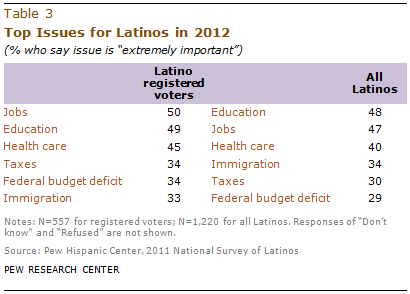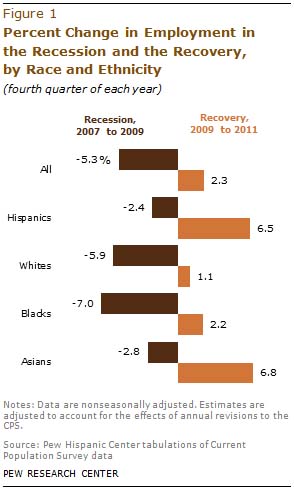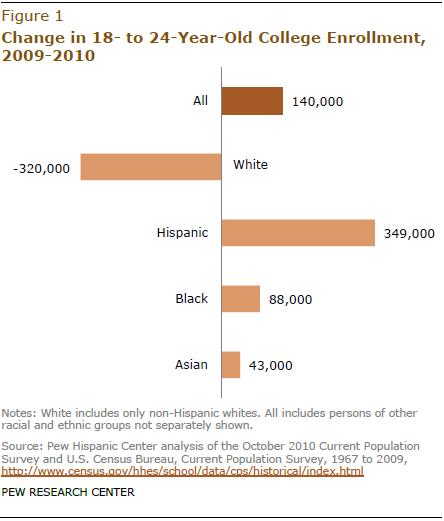President Barack Obama's decision to support marriage among homosexuals generated a jolt in the presidential campaign in the United States. The announcement introduced another ideological element into what is now thought to be a highly polarized campaign. Independently of its importance and the fact that some analysts think otherwise, civil rights, in my opinion, won't be a central issue in the voters' decision. All points toward the economy will continue being the dominant issue among voters, Hispanics included.
According to the 2011 National Survey of Latinos by the Pew Hispanic Center, the issues that worry the Hispanics registered to vote in the November elections the most are, in order of importance, jobs, education, and Health Care (all cited as very important by half or almost half of the survey takers, well above immigration, that appears in the sixth place being cited by 33% of those surveyed). Anyway, the order doesn't change much when the Hispanics not registered to vote are included. In this specific case, the issue of immigration jumps to fourth place (and cited by a percentage very similar to those that have registered).

There have been important changes for the Hispanic population in the most worrisome issues during the past four years, changes that are surely highly influential at the time of choosing a candidate: Job availability for Latinos has risen more than for the rest of the population (except for Asians), the number of Hispanics with access to a college has risen more than average, and the health care reform promoted by President Barack Obama benefits or could benefit Hispanics more than any other population sector.
Unemployment rate among Hispanics continues being one of the highest of the country, close to double that of four years ago. The recession has hit the Hispanics harder than the rest of the groups; this explains why it continues being the most important issue for them. But an analysis of the demographics of the Jobs recovery done by the Pew Hispanic Center shows that between 2009 and 2011, employment among Hispanics -- which had fallen 2.4% between 2007 and 2009 -- grew 6.5% in contrast with a 2.3% for all the population. The growth reflects, in general terms, the population growth, that was greater with Hispanics and Asians than the rest of the ethnic groups -- what also explains that unemployment levels remain in such a high position -- but the truth is that of the 3,156,000 jobs created between 2009 and 2011, nearly 40% were for Hispanics, and at the end of last year there were more Hispanics working than two years ago. Although slow, things seem to be going on the right path.

Another one of the Pew Hispanic Center's investigation demonstrates that something similar has been happening in the education field. According to the study, "from 2009 to 2010, the number of Hispanic young adults enrolled in college grew by 349,000, compared with an increase of 88,000 young blacks and 43,000 young Asian-Americans and a decrease of 320,000 young whites." Here the case of the population growth is also important. "However, population growth accounts for only a small share of the 24% Hispanic college enrollment spike from 2009 to 2010. During that same period, the total population of 18- to 24-year-old Hispanics grew by 7%." The rest is explained by better situations in other areas. "The share of Hispanic 18- to 24-year-olds who have completed high school increased to 73% in 2010 from 70% in 2009, and the share of young Hispanic high school graduates who are attending college increased to 44% in 2010 from 39% in 2009."

Of course I am not trying to insinuate that the Hispanics are now in the best of all worlds. One third of the jobs obtained by the Hispanics during the last two years were generated in the eating, drinking and lodging services sector and in the construction industry. And the Hispanics are not going to the best universities. "Much of the growth in college enrollment among young Hispanics has been at community colleges. Of all young Hispanics who were attending college last October (2010), some 46% were at a two-year college and 54% were at a four-year college. By contrast, among young white college students, 73% were enrolled in a four-year college, as were 78% of young Asian college students and 63% of young black college students." Financing continues to be a problem, and there are other variables that must be taken into account. But it's evident that in this field things have gotten better.
Likewise in the health sector, if the government's reform manages to survive the Supreme Court's analysis and the attacks from the Republicans in the nation's Congress. "The legislation has the potential to improve the physical health of the Latino community more than any other segment of the population," says Jens Erick Gould in a report for PODER magazine that will circulate at the beginning of next June. "Latinos are three times more likely to lack health insurance than any group," says in the article Olveen Carrasquillo, chief of the internal medicine division at the University of Miami Health System. "And Latinos are more likely to be in lower income groups. So to the extent that we're more likely to be uninsured and more likely to belong to the groups that are going to most directly benefit from the law, it will benefit Latinos disproportionately."
The President already has, according to the Pew Hispanic Center's surveys, the backing of the Hispanics. In a survey done last November, they favored the President over Mitt Romney on a 68 to 23 ratio. But Romney wasn't the Republican Party's official candidate at the time, something that now seems inevitable, and the preferences among all voters are closer: 49 to 47. If even after the mentioned changes the most important issues for the Hispanics -- employment, education and health -- continue to be high priorities, its clear that they will also be so for the rest of the Americans. And they will not be easily shoved by civil rights issues, even though the gay marriage support has generated such an impact.